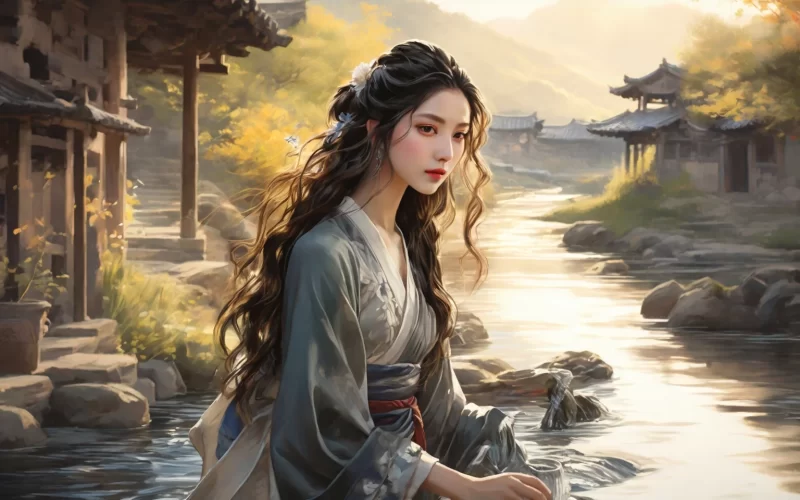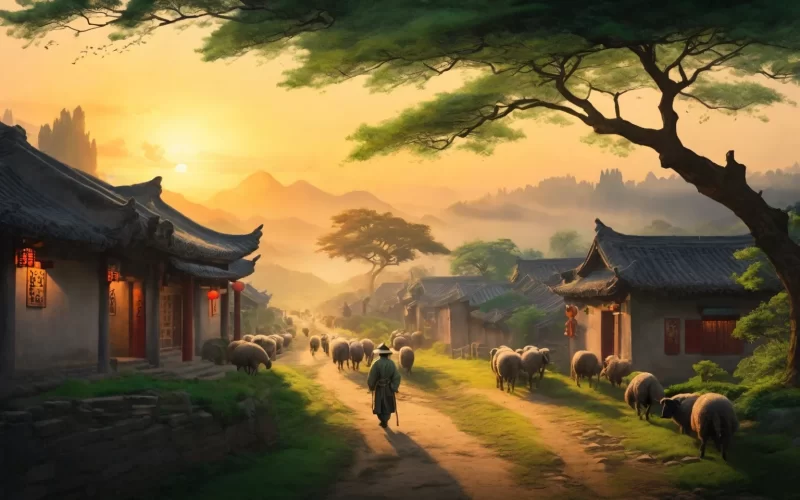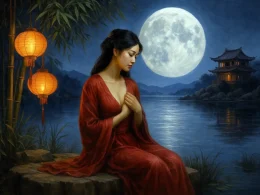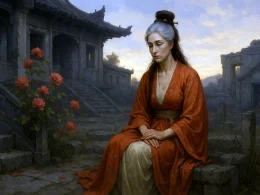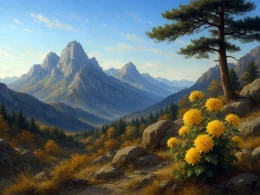Since beauty is prized throughout the land,
How could Xi Shi long remain in her humble place?
At dawn, she washed clothes by the southern stream;
By dusk, she was a lady in the northern palace.
One day, lowly — not to be spoken of with the rest;
The next, exalted, she stood out from all the rest.
No more would her own hands apply her powder,
Or arrange the silken robe upon her shoulder.
The more the king doted on her, the lovelier she grew,
Dazzling him away from all that was wise and true.
…The girls who once washed silk beside her stream
Were kept at a distance from her chariot's gleam.
And no maids in the houses nearby could ever,
By knitting their brows, match her beauty ever.
Original Poem
「西施咏」
王维
艳色天下重,西施宁久微。
朝为越溪女,暮作吴宫妃。
贱日岂殊众,贵来方悟稀。
邀人傅脂粉,不自著罗衣。
君宠益娇态,君怜无是非。
当时浣纱伴,莫得同车归。
持谢邻家子,效颦安可希。
Interpretation
This poem stands as a powerful work from Wang Wei’s early period of historical and socially-critical verse, fully showcasing the keen social insight and profound philosophical reflection on fate characteristic of his youth. Although titled after a legendary beauty, it is far from simple nostalgia for antiquity. Instead, with a cold, incisive brush, it dissects the complex and absurd relationship between individual worth, social recognition, and the favor of power. Through the dramatic case of Xi Shi’s transformed destiny, the poem reflects the universal anxieties and sense of injustice among the scholar-official class. It is, beneath its romantic veneer, a poem of social critique and a fable of fate.
First Couplet: 艳色天下重,西施宁久微。
Yànsè tiānxià zhòng, Xī Shī nìng jiǔ wēi.
A peerless beauty the world holds dear; / How could one like Xi Shi long remain lowly here?
The opening declares the poem’s core proposition: in a society that values "peerless beauty" (a metaphor for talent, opportunity, or any scarce resource), the truly exceptional will ultimately rise. This foreshadows Xi Shi’s fate, subtly conveys the poet’s confidence in his own talents and anticipation of success, and coolly points out the utilitarian, even cruel, logic of social selection.
Second Couplet: 朝为越溪女,暮作吴宫妃。
Zhāo wéi Yuè xī nǚ, mù zuò Wú gōng fēi.
Dawn saw her as a maid by the Yue-stream side; / Dusk found her a queen in the palace of Wu, a bride.
The extreme contrast between "dawn" and "dusk" dramatizes the suddenness and totality of a fate reversed. This is not just Xi Shi’s personal legend but the classic metaphor for how power can rewrite an individual’s destiny in an instant. The parallel structure and swift rhythm are charged with narrative tension and a sense of the absurd.
Third Couplet: 贱日岂殊众,贵来方悟稀。
Jiàn rì qǐ shū zhòng, guì lái fāng wù xī.
When lowly, was she from the common crowd distinct? / Only with honor came the sense she was extinct.
This couplet points directly to the fickleness of public opinion and the belatedness of recognition. "Was she distinct?" states an objective fact; "came the sense she was extinct" reveals a subjective construction. It sharply exposes the social and power-dependent nature of value judgment: whether one is deemed "rare" often depends not on intrinsic qualities but on social status. This is a profound irony and deepening of the premise that "beauty the world holds dear."
Fourth Couplet: 邀人傅脂粉,不自著罗衣。
Yāo rén fù zhīfěn, bù zì zhuó luóyī.
She bids others apply her rouge and cream; / No more she robes herself, it would seem.
Two contrasting details of daily life concretize the fundamental alienation that comes with "favor." The shift from the active ("bids") to the reflexive ("herself") symbolizes the loss of personal agency and transformation into an object adorned by power. Behind the honor lies deeper dependence and the retreat of the authentic self.
Fifth Couplet: 君宠益娇态,君怜无是非。
Jūn chǒng yì jiāo tài, jūn lián wú shìfēi.
The sovereign’s favor fosters ever more charming air; / His love makes right and wrong no longer her care.
This couplet delves into the psychological and ethical core of the power relationship. "Favor" and "charming air" form a vicious cycle, where favor distorts character, shaping a performative mode of existence. "No longer her care" highlights the ultimate privilege of royal favor—exemption from common morality and rules, entry into a distorted value system where only the sovereign’s love matters.
Sixth Couplet: 当时浣纱伴,莫得同车归。
Dāngshí huànshā bàn, mò dé tóng chē guī.
Those who with her once washed silk by the stream, / May not in the same carriage with her homeward gleam.
The focus shifts from palace to common life, from present to past, filled with a desolate sense of change. "In the same carriage home" represents a scene of equal, intimate, shared life, while "may not" coldly etches the chasm opened by class and fate. This is not merely Xi Shi’s estrangement from old companions but the eternal rupture with one’s original life-community caused by a sudden shift in individual fortune.
Seventh Couplet: 持谢邻家子,效颦安可希。
Chí xiè lín jiā zǐ, xiào pín ān kě xī.
A word to the neighbor girl who aped her frown: / Can copied knitted brows bring true renown?
The ending uses an allusion to elevate the poem’s reflection. The poet uses "aping the frown" as a metaphor, trenchantly satirizing those blind imitators who only see superficial glory ("charming air") but fail to discern the complex workings of power and the role of chance behind it. The rhetorical question "Can… bring true renown?" serves as both a warning to opportunists and a lament for the unreplicable nature of fate and the elusive quality of opportunity.
Holistic Appreciation
This is a structurally precise, ideologically progressive poem of socio-psychological analysis. Starting from "peerless beauty" as its logical premise, it unfolds sequentially: the "inevitability of rise," the "suddenness of fortune," the "fickleness of the world," the "alienation of favor," the "distortion by power," the "rupture of old ties," culminating in the "absurdity of aping"—forming a complete, circular argument. The poet acts as a cool historian and psychologist, layer by layer exposing the social mechanisms and truths of human nature behind the "Xi Shi phenomenon."
Wang Wei’s brilliance lies in avoiding moral judgment of Xi Shi herself (e.g., the "femme fatale" trope) or settling for a simple sigh over life’s unpredictability. Instead, he places Xi Shi within a complex network formed by "the world" (social values), "the sovereign" (supreme power), "the crowd" (common folk), and "companions" (equal relationships) to examine the systematic changes in her identity, psychology, and relationships. Thus, the poem is both a lament for individual fate and a profound critique of power structures, social psychology, and the alienation of value. Xi Shi in the poem is both the favored and the imprisoned, both the lucky one and the sacrificial victim.
Artistic Merits
- Tight Integration of Narrative and Discourse: The first six couplets outline Xi Shi’s fate through highly condensed narration, with each couplet naturally leading to a point of universal reflection (e.g., "Only with honor…"; "His love makes right and wrong…"). This creates a dynamic where event and principle engender each other, concrete and abstract illuminate one another.
- Masterful Use of Contrast: Pairs like "dawn" and "dusk," "lowly" and "honor," "distinct" and "extinct," "bids others" and "herself," "favor" and "charming air," "once" and "may not" are densely packed. These contrasts not only heighten dramatic effect but, more importantly, tear apart appearances to expose underlying truths.
- Depth of Psychological and Social Analysis: The poem delves into the mindset of the favored one (traces the evolution to "ever more charming air"), the shifting perceptions of the crowd (notes how they only later realize her value), and exposes how power reconfigures human relations (creating moral exemption and severing old bonds). It displays an analytical, almost dissecting, tone rare in lyrical poetry.
- Subversive Use of Allusion: The closing reference to "aping the frown"—a classic anecdote typically deployed to mock superficial or clumsy imitation—is masterfully elevated by Wang Wei to a philosophical plane. He transforms the trope from a simple satire of behavior into a profound inquiry into the relationship between innate fortune and conscious effort, between inner essence and outward semblance, and between sheer contingency and perceived necessity. This repurposing of a familiar cultural story injects the poem with a penetrating, conceptual sharpness, demonstrating the poet's ability to infuse conventional material with new and critical resonance.
Insights
This work is a mirror that transcends its time, reflecting not only the officialdom and social mentality of the Tang but also the phenomena of "'favor' culture and the dependency of value" present in any era. It reveals that the realization of individual worth, if overly dependent on the recognition and bestowal of external power ("the sovereign’s favor"), will inevitably lead to the alienation of the self ("No more she robes herself") and estrangement from community ("May not… homeward gleam").
For the modern reader, this poem warns against the simplistic equation of success with "gaining favor" and the reduction of value to "being held dear." In the workplace, society, and even online, we may have witnessed or experienced "Xi Shi-like" ascents and "aping-the-frown" imitations. Wang Wei’s poem reminds us: True "rareness" should not be defined solely by "honor" but should be rooted in irreplaceable creation and independent character. "Aping" others is ultimately futile. Only by understanding the complex relationship between one’s own qualities and the opportunities of the age can one maintain clarity amidst the noise and preserve authenticity amidst change.
With a poem chanting a beauty’s tale, the poet completes a profound dissection of power, fate, and self-worth. Its cool tone and penetrating thought elevate "Chant of Xi Shi" beyond its specific time and figure, making it a deeply philosophical poem that interrogates the enduring questions of the human world and the human heart.
Poem translator
Kiang Kanghu
About the poet

Wang Wei (王维), 701 - 761 A.D., was a native of Yuncheng, Shanxi Province. Wang Wei was a poet of landscape and idylls. His poems of landscape and idylls, with far-reaching images and mysterious meanings, were widely loved by readers in later generations, but Wang Wei never really became a man of landscape and idylls.






